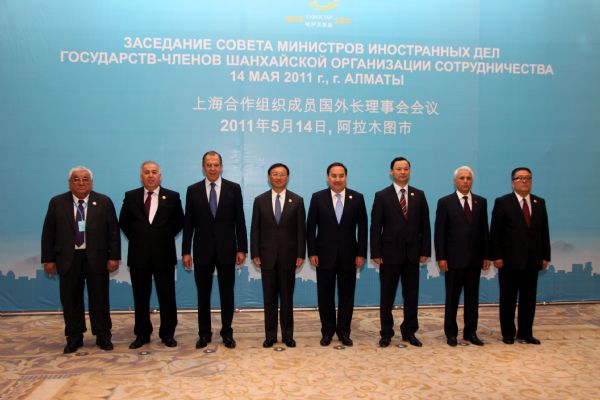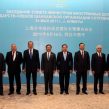
Afghanistan: NATO Out, SCO In?
Publication: Eurasia Daily Monitor Volume: 8 Issue: 98
By:

Next month, Afghanistan may gain observer status in the Shanghai Cooperation Organization (SCO). The organization considers this to be an appropriate step forward given that the Afghan people “gradually take over the responsibility for all key areas of life in the country, including ensuring the security and socioeconomic development of the IRA [Islamic Republic of Afghanistan], [and the] emergence of a friendly Afghanistan as an independent, peaceful and prosperous state,” according to an SCO statement (https://www.sectsco.org/EN/show.asp?id=286).
The possibility of Kabul moving closer to the SCO was discussed at the Council of Foreign Ministers meeting in Almaty last week. The announcement on Afghanistan’s future relations with the SCO will be made at the organization’s annual summit in Astana on June 15. To date Afghanistan has participated in SCO activities as a guest. The SCO consists of China, Russia, Kazakhstan, Kyrgyzstan, Tajikistan and Uzbekistan. Iran, Pakistan, Mongolia and India have observer status with the organization.
Starting this year, the SCO plans to apply the five-year Counter-narcotics Strategy that aims at reducing drug production in Afghanistan (www.kazinform.kz, May 14). The SCO has wanted deeper involvement in Afghanistan’s security and economy for a number of years.
After gaining observer status, Kabul might seek full membership. India, one of the SCO’s observers, has requested an upgrade to full membership (The Times of India, May 16). “The ministers rated positively the efforts of the SCO member states contributing to the cause of economic reconstruction of Afghanistan, and called on the international community to provide further assistance to the government and people of Afghanistan,” stated the joint declaration by the Council of Ministers.
According to the Russian media, NATO’s gradual withdrawal from Afghanistan starting in 2014 will create an opportunity for engagement with the SCO, which is already active in the wider Central Asian region. So far, Russia has been showing interest in adding Afghanistan to the SCO. “Recently Afghanistan has requested observer status. This issue will be discussed at the forthcoming summit,” said Russian Foreign Minister Sergei Lavrov (www.rian.ru, May 17).
To date, China’s investment in Afghanistan has been increasing. Sharing only a 46 mile border, China’s “interest in Afghanistan traces primarily to the exploitation of energy and mineral resources—valued at $1 trillion by audits,” argues Niklas Norling, the Director of the Central Asia-Caucasus Institute and the Silk Road Studies Program (World Politics Review, May 18).
The interest in boosting China-Afghanistan ties is mutual. Last week, Afghanistan’s Foreign Minister Zalmay Rasoul spent four days in China meeting with his counterpart Yang Jiechi and discussed Beijing’s help in developing Afghanistan’s economy. For Kabul, the SCO offers an important venue for further regional economic integration that can be achieved even in the absence of political reform. Like in African states, China has demonstrated an ability to navigate Central Asia’s corrupt political systems without applying any pressure to increase the transparency of either the political or economic conditions (www.fmprc.gov.cn, May 10).
Most economic ties within the SCO are based on the principle of bilateral relations between China and other members, and not on the principle of multilateralism. For example, China is actively developing cooperation with Kazakhstan and Turkmenistan in the energy sector. For Kyrgyzstan and Tajikistan, China has become an important exporter of consumer goods. By contrast, however, economic cooperation between Russia and China is carried out mainly outside the framework of the SCO.
Founded in 2001, the SCO celebrates its tenth anniversary this year. Starting in 2003, the SCO has held regular counterterrorism exercises with the participation of member countries to collectively combat the “three evils” of terrorism, separatism or extremism. The exercises usually involve anywhere from 1,000 to 10,000 troops.
According to the SCO, the organization strives to strengthen mutual trust and good neighborly relations among member countries, to maintain peace through collective efforts and to boost security and stability. However, by joining the SCO, Afghanistan should not get its hopes too high regarding the security sector. Last year, the SCO once again confirmed that the locus of cooperation under its aegis is concentrated mostly on political and economic cooperation. The June 2010 ethnic violence in Kyrgyzstan’s south and low-intensity armed conflict in Tajikistan’s Kamarob gorge in September 2010 have once again demonstrated that the SCO, along with other regional security organizations, are not able to meet the most critical challenges the Central Asian region faces today.




